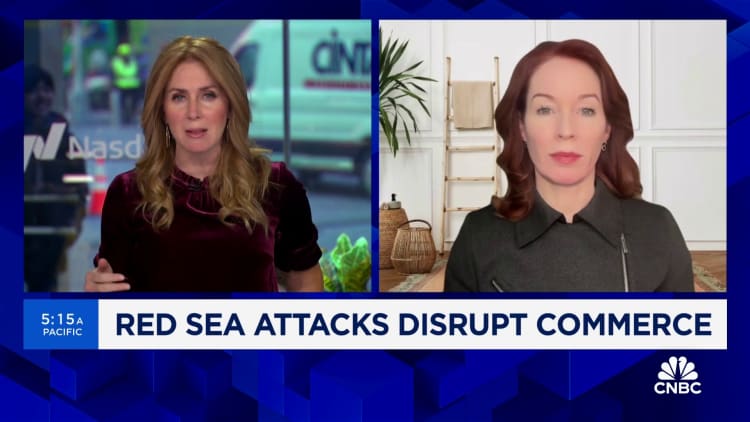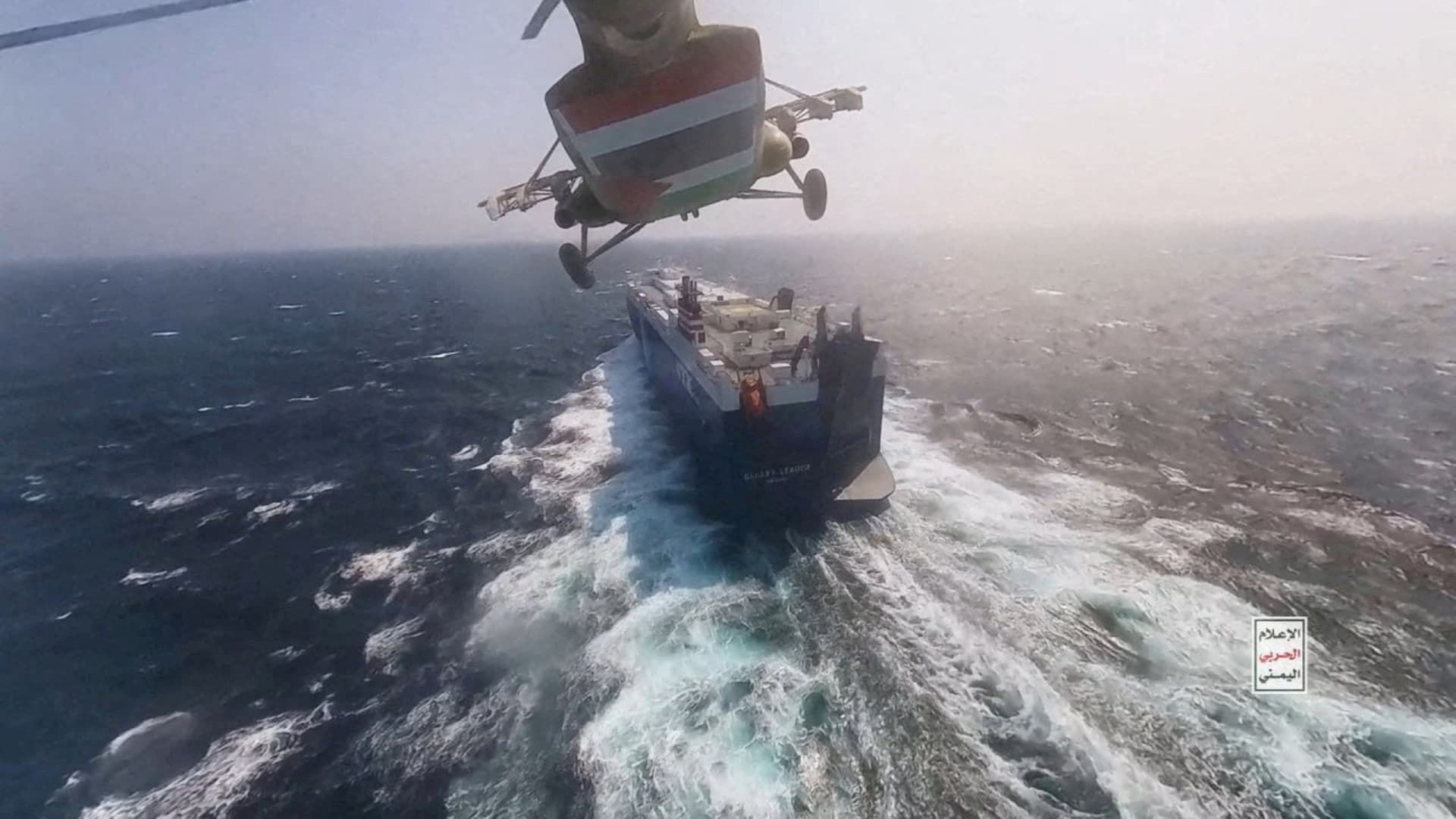Houthi military helicopter flies over the Galaxy Leader cargo ship in the Red Sea in this photo released on Nov. 20, 2023.
Houthi Military Media | Via Reuters
Drone and missile attacks by Yemen-based Houthi militants have upended shipping through the Red Sea and Suez Canal, a narrow waterway through which some 10% of the world’s trade sails.
U.S. Central Command over the weekend said it shot down “14 unmanned aerial systems launched as a drone wave from Houthi-controlled areas of Yemen.” A day later, oil major BP announced it would “temporarily pause” all transits through the Red Sea, following similar decisions by shipping giants Maersk, MSC, Hapag-Lloyd, and CMA CGM.
The Pentagon said Monday it was forming a maritime security coalition with allies to counter the threat and provide protection for shippers, who as of Tuesday had diverted more than $30 billion worth of cargo away from the Red Sea.
Many tankers and cargo ships that would normally transit via the Suez Canal to the Indian Ocean are instead being rerouted around the continent of Africa, which adds 14 to 15 days on average to sea voyages. International logistics firm DHL warned that “the diversion will significantly increase transit times between Asia and Europe and require shipping lines to increase planned capacity.”
The changes have already spiked insurance premiums on ships and contributed to a bump in oil prices. And U.S. military might in the area may not be enough to quell the disruptions.
“A dedicated naval task force will be able to more effectively intercept drone and missile attacks and prevent boarding operations, but the task force won’t be able to be everywhere all at once,” Ryan Bohl, senior Middle East and North Africa analyst at Rane, told CNBC.
“So long as there are significant numbers of civilian ships moving through this area, the Houthis will have plenty of targets to choose from.”
But who are the militants attacking the ships, and why are they doing it? And will a U.S.-led naval security coalition be effective enough to make the Red Sea trade routes safe for trade again?
Who are the Houthis?
The Houthis are a Shiite sect of Islam called Zaydi Muslims, a minority in mostly-Sunni Yemen whose roots there go back hundreds of years. They emerged as a political and militant organization in the 1990s, opposing the Yemeni government over issues like corruption, U.S. influence and perceived mistreatment of their group.
After carrying out insurgencies against the state from the early 2000s onward, the Houthis capitalized on the instability that followed the 2011 Arab Spring to increase their following. In 2003, influenced by the Lebanese Shiite militant organization Hezbollah, they adopted the official slogan: “God is the greatest, death to America, death to Israel, a curse upon the Jews, victory to Islam.”
Supporters of the Houthi movement shout slogans as they attend a rally to mark the 4th anniversary of the Saudi-led military intervention in Yemen’s war, in Sanaa, Yemen March 26, 2019.
Khaled Abdullah | Reuters
In 2014, Houthi rebels took over the capital Sanaa, setting off a war with the Saudi and Western-backed Yemeni government. A Saudi-led Arab coalition in 2015 launched an offensive against Yemen which went on to create what the U.N. called one of the worst humanitarian crises in the world.
The war continues to this day with limited cease-fires, and the Houthis have launched hundreds of drone and projectile attacks on Saudi Arabia since it began, with many of the weapons allegedly provided by Iran.
The Houthis now control most of Yemen, including Sanaa and the important Red Sea port of Hodeida, and their ranks have massively expanded along with their military capabilities, aided significantly by Iran.
Some call the group an Iranian proxy, but many Yemen experts say it is not a direct proxy of the Islamic Republic. Rather, the two have a mutually beneficial relationship but the Houthis pursue their own interests, which often align with Iran’s, and they enjoy Tehran’s military and financial support.
Why are they attacking cargo ships?
Yemen’s Houthis have made clear their intention of targeting Israeli ships and any ships headed to or from Israel, in retaliation for the country’s war in Gaza that has so far killed more than 20,000 people there and triggered a humanitarian catastrophe. Israel launched its offensive on Oct. 7, after the Palestinian militant group Hamas carried out a brutal terrorist attack that killed some 1,200 people in Israel’s south and took another 240 hostage.
Mock drones and missiles are displayed at a square on December 07, 2023 in Sana’a, Yemen.
Mohammed Hamoud | Getty Images
So far, the Houthis have deployed direct-attack drones, anti-ship missiles, and even physically seized a merchant ship via helicopter landing. And they don’t plan on stopping.
Mohammed al-Bukaiti, a senior Houthi political official, said during a news conference Tuesday: “Even if America succeeds in mobilizing the entire world, our military operations will not stop unless the genocide crimes in Gaza stop and allow food, medicine, and fuel to enter its besieged population, no matter the sacrifices it costs us.”
What happens next?
The U.S.-led naval coalition, which is still being formed, “is collectively capable of deploying a considerable maritime force in the Red Sea,” said Sidharth Kaushal, sea power research fellow at the London-based Royal United Services Institute. Other members of the multinational initiative include the U.K., Bahrain, Canada, France, Italy, the Netherlands, Norway, and Spain.
“As we have seen with the USS Carney’s recent activity in the region, modern vessels can provide considerable protection to both themselves and other ships in a theatre against air and missile threats,” Kaushal said, referencing the American guided-missile destroyer that shot down 14 drones on Saturday.
The Galaxy Leader, recently seized by Yemen, shown in close-up satellite imagery near Hodeida, Yemen.
Maxar | Getty Images
But the challenge remains, Kaushal said, because of the “relatively low cost of the drones and missiles” targeting shipping and the fact that naval ships still have to return to friendly ports to reload their air defense interceptors.
Another major risk is the threat of escalation. The most effective way to take out the Houthi threat is to attack their launch sites — which “would not automatically result in a regional conflagration, but could raise the risks of one,” Kaushal said, adding that “I don’t think that either the Houthis and Iran or the U.S. wants a wider escalation at this point in time.”
Corey Ranslem, CEO of maritime security firm Dryad Global, expects the threat to shipping “to continue for the foreseeable future as long as the conflict continues in Gaza,” he told CNBC.
“Depending on how the U.S.-led coalition comes together, we could also see the threat level against commercial shipping decline if their efforts are effective,” he said.


Ranslem predicts minimal economic impact in the short term. But each year there are “approximately 35,000 vessel movements … primarily trading between Europe, the Middle East and Asia” in the Red Sea region, accounting for roughly 10% of global GDP, he said.
That means that if the threats continue, countries in those regions could see significant economic impacts. Israel’s economy could be seriously affected as well if more shipping companies decline to take on cargo destined there; two companies have already done just that.
“For the Houthis, the challenge will be to present enough of a threat to deter shipping companies from passing through the Bab al-Mandab while avoiding actions that could trigger an overwhelming military response from the U.S.-led coalition,” said Torbjorn Soltvedt, principal MENA analyst at Verisk Maplecroft.
“The Houthis don’t need to physically prevent ships from passing through the Red Sea; they only need to cause enough disruption to make maritime insurance premiums prohibitive or compel most shipping liners to suspend activities there.”

